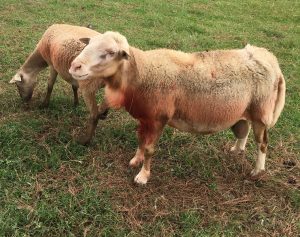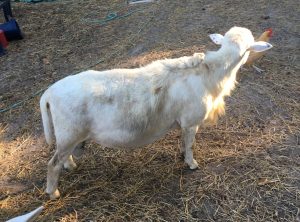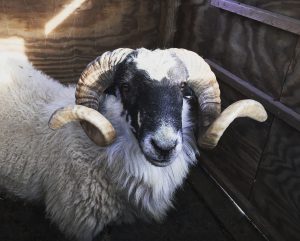How Ram Selection Affects Your Flock

Rams have such an important job in a long term breeding program; they represent 50% of your future flock genetics. That 50% really matters in the long run. If you allow any flaw you can’t truly live with, it will show up tenfold from our experience. We’ve sold or culled a good many rams because they just had something we didn’t like or didn’t mix well with our particular farm.
A ram that does great at one farm won’t always perform as well at another; we work to find rams that are a good fit for our local conditions, build, breeding system, and other factors. We sell if we think he’ll do well in a different environment, or choose to cull if we discover a problem that we wouldn’t want to see passed on in someone else’s flock. Some of the reasons we’ve parted with rams include producing lambs with too much bone, too much height, not enough thrift, badly formed feet, hooves that don’t stay nice, or poor parasite resistance. Rams that no matter what we did weren’t amenable to being worked by dogs or that did not like they way we humans worked them also found new homes with people who work differently.
It’s vitally important you really search for a ram that fits your needs, and that he comes from a farm that also has similar goals as yours, meets your needs for breeding, and will take the strain of whatever environment he will live in.

For example, parasite loads are different on every farm, and each parasite’s drug resistance also varies by location. A particular ram might do well one place but very poorly at another based solely on different worm load, treatment resistances, and that ram’s individual resistance against individual worm species. If the ram is producing otherwise good stock but he or his lambs have a lot of parasite problems in your flock, you should sell him on; he might be a star performer at a farm with different worms.
Whether you breed a particular ram in the first place is solely up to you as the farmer, and what you hope to get. You may actually get decent lambs with stronger traits than the ram himself from his mixing with your ewes, or you might get ones that die quickly, or require such input from you that they aren’t financially feasible over the long run. If a combination doesn’t work for you, it’s better to cull or sell any resulting lambs completely out of your flock quickly, rather than allowing genetics that don’t fit your farm to remain and mix with the rest of your lines over time.
What we look for in flock genetics

We live in an area where barber pole worms are the primary parasite, and barber pole resistances in our entire area of the East Coast to most wormers are high. Hence, good resistance to barber pole worm is one of our absolute top priorities, and the rams and ewes that are in our long term flock almost never require treatment. We have several sheep we’ve never had to worm, and a second group who have only ever required treatment a couple of times over the years we’ve had them, so they have become the core of our long term breeding flock.
Our flock also lives on soft, sandy, but fairly well drained soil, so we need hooves that stay neat without constant trimming. Pastures don’t hold well as standing forage over the winter here, so the flock must do well on hay in the winter.
Our ewes need to regularly twin and breed out of season, as we rely on good lambing rates and the STAR system to keep our system economical for our area, and to fill a regional need for lamb in the off season.
Finally, because we raise our lambs for meat, we look for fast growth, good feed efficiency, good muscling, and a reasonable height (tall sheep are inefficient); these traits come after hardiness, since a lamb that is well muscled doesn’t do well if it has worm issues, bad feet or teeth, and is generally hard to keep alive.